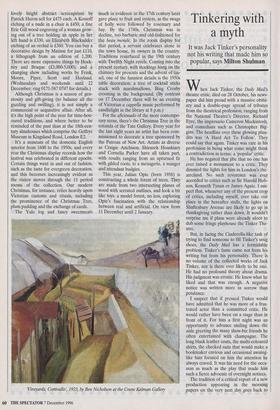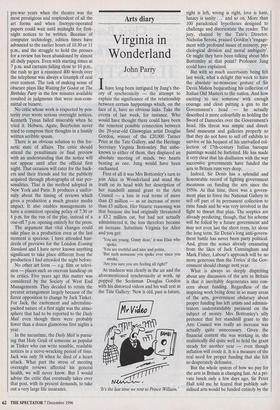Tinkering with a myth
It was Jack Tinker's personality not his writing that made him so popular, says Milton Shulman When Jack Tinker, the Daily Mail's theatre critic, died on 28 October, his news- paper did him proud with a massive obitu- ary and a double-page spread of tributes from the theatrical profession, ranging from the National Theatre's Director, Richard Eyre, the impresario Cameron Mackintosh, and comedians such as Christopher Big- gins. The headline over these glowing plau- dits was 'A Hard Act To Follow'. They could say that again. Tinker was rare in his profession in being what some might think a contradiction in terms: a 'popular' critic.
He has negated that jibe that no one has ever raised a monument to a critic. They dimmed the lights for him in London's the- atreland. No such reverence was ever accorded to critics such as Sir Harold Hob- son, Kenneth Tynan or James Agate. I sus- pect that, whenever any of the present crop of critics, including myself, ever take our place in the hereafter stalls, the lights on Shaftesbury Avenue are likely to go up in thanksgiving rather than down. It wouldn't surprise me if plans were already afoot to dub some fringe playhouse the Tinker The- atre.
But, in facing the Cinderella-like task of trying to find someone to fill Tinker's snug shoes, the Daily Mail has a formidable problem. Tinker's fame came not from his writing but from his personality. There is no volume of the collected works of Jack Tinker, nor is there ever likely to be one. He had no profound theory about drama. His judgment was erratic. He knew what he liked and that was enough. A negative notice was written more in sorrow than petulance.
I suspect that if pressed Tinker would have admitted that he was more of a frus- trated actor than a committed critic. He would rather have been on a stage than in front of it. For him a first night was an opportunity to advance smiling down the aisle greeting the many show-biz friends he often entertained with champagne. The long black leather coats, the multi-coloured shirts, the checked suits that would make a bookmaker envious and occasional awning- like hats focused on him the attention he always craved. It was his need for the occa- sion as much as the play that made him such a fierce advocate of overnight notices.
The tradition of a critical report of a new production appearing in the morning papers on the very next day goes back to pre-war years when the theatre was the most prestigious and resplendent of all the art forms and when linotype-operated papers could wait until midnight for first- night notices to be written. Because of computer technology, edition times have advanced to the earlier hours of 10.30 or 11 p.m., and the struggle to hold the presses for a review has been abandoned by almost all daily papers. Even with starting times at 7 p.m. and curtains falling close to 10 p.m., the rush to get a reasoned 400 words over the telephone was always a triumph of zeal over content. The task of making sense of obscure plays like Waiting for Godot or The Birthday Party in the few minutes available resulted in judgments that were non-com- mittal or bizarre.
No critic whose work is respected by pos- .terity ever wrote serious overnight notices. Kenneth Tynan failed miserably when he tried it. Hobson, Agate, Beerbohm never tried to compress their thoughts in a hastily written scribble spasm.
There is an obvious solution to this fre- netic state of affairs. The critic should attend the penultimate or final preview with an understanding that the notice will not appear until after the official first night. That occasion will cater for the back- ers and their friends and for the publicity acquired through photographs of star per- sonalities. That is the method adopted in New York and Paris. It produces a unifor- mity about the timing of reviews which gives a production a much greater media impact. It also enables managements to have a consistent opening policy of 7.30 or 8 p.m. for the run of the play, instead of a one-off 7 p.m. opening entirely for the press.
The argument that vital changes could take place in a production even at the last moment is specious. I have attended hun- dreds of previews for the London Evening Standard and I have never known anything significant to take place different from the production I had attended the night before.
No other art form — e.g. film or televi- sion — places such an onerous handicap on its critics. Five years ago this matter was considered by the Society of West End Managements. They decided to retain the present arrangement largely because of the fierce opposition to change by Jack Tinker. For Jack, the excitement and adrenaline- packed nature of a first night was the atmo- sphere that had to be reported to the Daily Mail even though there were probably fewer than a dozen glamorous first nights a year.
In the meantime, the Daily Mail is pursu- ing that Holy Grail of someone as popular as Tinker who can write sensible, readable notices in a nerve-wracking period of time. Jack was only 58 when he died of a heart attack. What part the stress of meeting overnight reviews affected his general health, we will never know. But I would advise the critic that eventually takes over that post, with its present demands, to take out a very large life insurance.



















































































 Previous page
Previous page